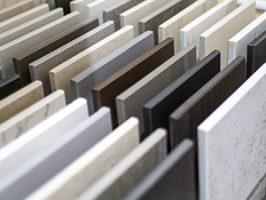The Difference Between Stone Tiles and Stone-Like Tiles
Stone-Like Tiles and Actual Stone Tiles
If you are planning on selecting tile for your floors, walls or kitchen backsplashes, bathroom showers, laundry rooms, and other spaces, you should know the difference between tiles that look like natural stone and actual natural stone tiles. Advances in technology have enabled tile manufacturers to produce tiles that look remarkably like natural stone. Although the word "tile" is used to describe both manmade and natural stone tiles, differences between the two types of tile can affect the cost and longevity of your installation.
Manufactured Tile
Porcelain and ceramic are made from clay and kiln fired. Glazed tiles are non-porous, and therefore easier to keep clean than unglazed tiles, however, unglazed tiles are less likely to show signs of wear, since the entire tile is the same color. Cement tiles may also mimic the look of natural stone, but are usually not as convincing. Unglazed, porous tiles, as well as porous grout lines, should be sealed to inhibit staining.
Natural Stone Tile
Natural stone tiles are a product of planet Earth. Granite and slate tiles are among the hardest and most durable of natural stone tiles. Marble, limestone, travertine, and other types of natural stone are also very durable, but more prone to scratching.
Natural stone tiles can be sensitive to acidic substances, such as wine, vinegar, or certain cleaners. Fortunately when surface damage or acid etching happens, the finish can be honed and polished to like-new again.
The porosity of natural stone determines its stain resistance. Some types of natural stone are more porous than others. A qualified stone fabricator or stone restoration contractor can determine whether your natural stone tiles ought to be sealed. Some highly polished stone tiles may not even absorb a sealer. Many stains can be removed from natural stone using DIY methods or by a stone restoration contractor.
Choosing Your Tile
For areas with low traffic and minimal use, ceramic tiles are a budget-friendly option. Glazed ceramic is low maintenance, stain resistant, and unaffected by harsh chemicals. Porcelain tiles are idea for exterior applications. Unglazed porcelain or natural stone treated for slip resistance are great choices for any areas where slip and fall accidents are a concern.
Natural stone is truly unique. There is zero chance that your installation will look exactly like someone else's. Natural stone tiles are generally more expensive than man-made tiles, but with proper care and maintenance, natural stone tile installations can last for a lifetime.
If you have specific questions or concerns about your installation and would like some guidance in making the most appropriate material selection for your budget, design, and functional needs, feel free to contact us.
This is one of a series of articles written and published on behalf of Surface Care PRO Partners.

